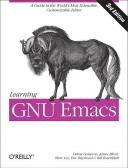Книга: Learning GNU Emacs, 3rd Edition
3.2.5 Are Emacs Searches Case-Sensitive?
3.2.5 Are Emacs Searches Case-Sensitive?
By default, Emacs searches are not case-sensitive. Look at the Options menu and you'll see that the option Case-Insensitive Search is the only option that is checked by default.
What does this mean in practical terms? If you search for the word random, the search finds random, Random, and RANDOM, as well as oddities like RanDoM and rANdOM. When doing replacements, Emacs pays attention to the form of the word being replaced and replaces it with the same case. If you replaced random with tandem, Random would be replaced with Tandem, and RANDOM would be replaced with TANDEM. If you mix capitalization, the replacement string appears just as you type it. healthbug would be replaced with HealthBug if that was the case in the replacement string. In other words, the default search and replacement operations usually do what you want: they find a search string regardless of its case and adjust the replacement appropriately for its context. However, sometimes you need finer control.
The variable case-fold-search determines whether searches are case-sensitive. It applies to all searches: incremental searches, word searches, searches within search-and-replace operations, and so on. By default, case-fold-search is set to t, which means "ignore case unless the user types in mixed or uppercase." This sensible default is usually just what you want. But if you need case-sensitive searches, the Case-Insensitive Search option on the Options menu provides an easy way to experiment with this variable.
Likewise, if you don't want Emacs to adjust the case of your replacement strings, you can set the variable case-replace. Again, its value is t (for "true") by default, which means "adjust the case of a replacement string to match the original text"—that is, capitalize the replacement if the original word was capitalized and so on. Setting this variable to nil means "never adjust the case of the replacement string; always put it in exactly as I typed it." To change the value of case-replace, type M-x set-variable Enter case-replace Enter nil Enter (there's no menu option for this variable).
Both the menu option and the set-variable command change the behavior of Emacs only temporarily. If you start a new editing session, you'll be back to the default behavior. This is probably what you want, because searching separately for capitalized and lowercase words is inconvenient.
You can set the value for the Case-Insensitive Search option permanently by selecting Save Options from the Options menu or by adding this line to your .emacs file:
(setq-default case-fold-search nil) ; require exact matches
To set case-replace permanently, add the following line to your .emacs file. You'll need to restart Emacs to have the change take effect.
(setq-default case-replace nil) ; never change case when replacing
You could change these variables through Emacs's interactive customization facility, Custom, instead (see Chapter 10).
- Shared Cache file
- Интеграция Windows SharePoint и Microsoft Office
- Получение помощи по Windows SharePoint Services 3.0
- Службы Windows SharePoint
- Версии служб Windows SharePoint
- Продукты и технологии Microsoft SharePoint
- Переход по узлу SharePoint и домашней странице
- Просмотр списков на узле SharePoint
- Отправка данных в списки SharePoint по электронной почте
- Глава 3 Виртуальные машины VMware Workstation
- DiskExplorer от Runtime Software
- 1.5.2. Slackware




